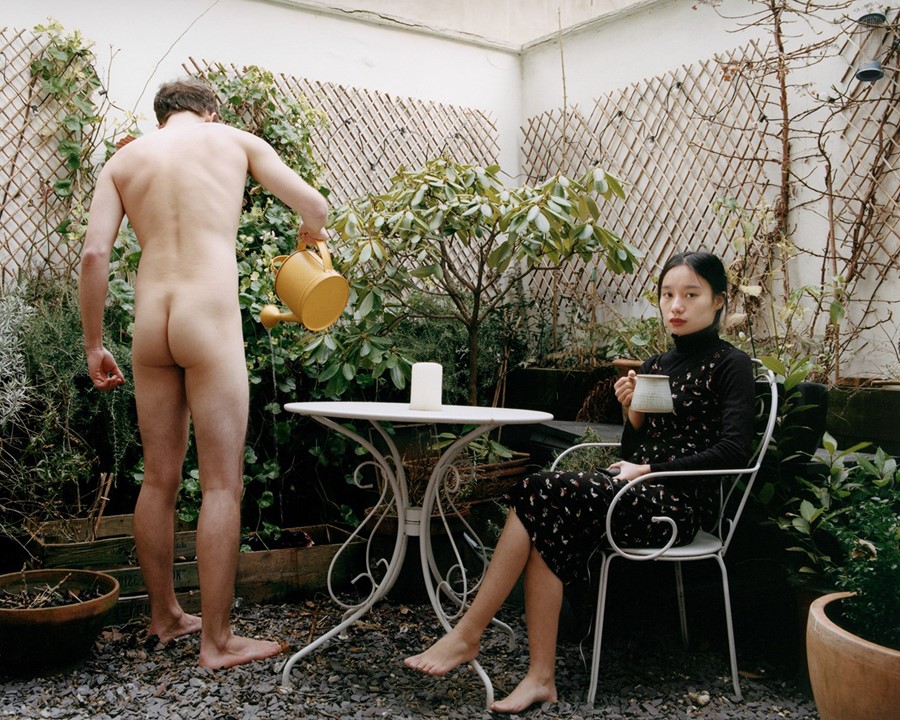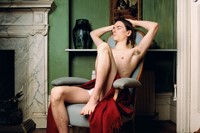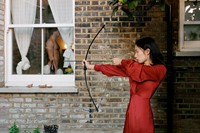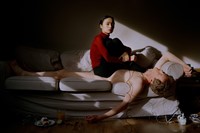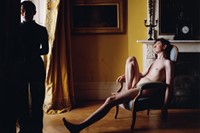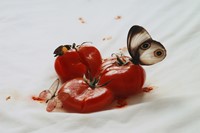“I find it important to show my story, that I am the creator and this is what I desire,” Yushi Li tells AnOther of her debut book, Baroness
Yushi Li photographs her desires. Drawing us into the world of her idiosyncratic fantasies, the third issue of Baroness (published by Baron Books) presents Li’s sexual desire enacted for the camera in staged images using men she’s procured from dating apps. Her debut book explores the bizarre and illusory sense of intimacy fostered by the internet, and toys with the notion of the male gaze and the pervasive, gendered power dynamic of photographer and model.
Throughout all Li’s projects featured in Baroness – My Tinder Boys, Your Reservation is Confirmed, Painting, Dreams and Love, and I Hope You Like What You Have Seen – her male subjects are naked and vulnerable with their flaccid penises exposed as they lay prone on a sofa or busy themselves with a domestic task. On the occasions she herself appears in the images, Li is clothed and dominant, breaking the fourth wall by meeting our eye with an impassive stare that doesn’t seek or require our approval.
While she’s interested in disrupting the conventions of the male gaze by asserting her own desires, Li’s work doesn't naively attempt to simply invert this pervasive tradition or claim to nullify its insidious power – her images are more complex and nuanced. Steeped in art history and the theories of Laura Mulvey and Lacan, Li is the hunter and Tinder has provided an abundant ground in which to track down her quarry. Yet she explains to AnOther why she has no wish to subjugate the men she photographs: “I don’t think I photograph the men in any sort of degrading way … it’s not like, ‘This is what you did to us so I'm going to do the same to you.’ It’s more like, ‘As a woman, I can also express my desire, and I desire this man.’”
Here, in her own words, Yushi Li reflects on the process of enlisting strangers from the internet to depict her sexual fantasies for the camera.
“I think the continuing theme in my work is this idea of the gaze and the complex power relationship between the looker and the looked at. My Tinder Boys was when I started being interested in this question. At that point, it was just me looking at these men, and then I started putting myself in the picture and also trying to reference or reflect on art history.
“I turn my fantasies into photographs. For example, the one where I have an arrow shooting the man. I feel like I enjoy being the hunter. Or the one where I’m sitting on the man. That one is inspired by The Nightmare by Henry Fuseli. In the original painting, it’s a monster sitting on this woman and trying to seduce her while she’s sleeping. I remember when I saw this painting I thought immediately, ‘I want to be the monster.’ This kind of fantasy I have.
“In my work, I try to be the one who’s in control and who has the power” – Yushi Li
“A lot of people read my work as a reverse of the male gaze, which I understand because the man is naked, the woman is clothed. I think it’s quite direct and obvious. At the same time, by photographing some sort of mundane activities that involve both of us, I try to not just simply reverse the gender roles. I don’t think I photograph the men in any sort of degrading way … it’s not like, ‘This is what you did to us so I’m going to do the same to you.’ It’s more like, ‘As a woman, I can also express my desire, and I desire this man.’
“Before I started My Tinder Boys I was using Tinder and a lot of men on there are very direct. They're like, ‘I’m here for sex. Are you into it?’ We have terms like ‘fuck boy’, but I feel like I can also be a predator or a hunter, searching for the things I want.
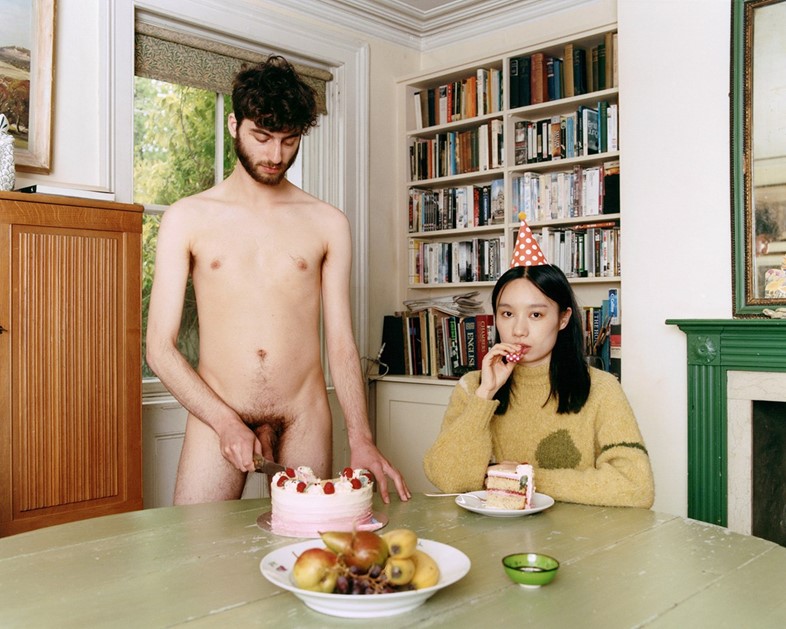
“In my work, I try to be the one who’s in control and who has the power. I think it’s really interesting that this power is not fixed, it’s kind of like a game or fantasy for me to explore… the shifts of power. Because it’s not guaranteed that I actually have power over them or they will definitely obey me. Maybe I feel like there’s some sort of tension between us, or they will enjoy showing themselves to me.
“My images are staged … they’re very constructed and planned. I know some people’s pictures are more poetic or emotional in that way but I think my images are maybe more static. Most of the time, [before shooting] I have a rough idea in my mind, especially in terms of what kind of activity we will do. And then I will try to look for locations and models that match the scene I have in my mind. Sometimes some of the images are inspired by paintings, so those are clearer because I have a reference.
“I just want to show: this is what I want. And I hope that more and more women can do this” – Yushi Li
“Sometimes there’ll be accidents when something appears in the image that I didn’t plan. But I think, in a way, these accidents are nice because they can be a surprise. In one of the images in the book, there’s a man on the chair and I’m standing on the left but it’s very dark, you can’t really see me. That image is inspired by The Room by Balthus, a painting of a woman lying naked and a girl opening the curtain to look, to review her body. After I shot the image, I realised the man’s foot was pointed up at a right angle. At first, I was annoyed because I didn’t notice this when I was taking the picture. And this is something I find quite interesting … I can’t see all the things until I see the photograph. And now I feel like, it’s actually kind of nice … the foot is like an erection, in the way.
“One of the reasons I wanted to photograph the men naked is I was trying to show how quickly we can get very intimate with a stranger. The internet facilitates this process. You feel like you have access to thousands of people. You can get matches very easily, you can get a date, and if this date doesn’t work, I just get another one. It just feels like everyone is replaceable and disposable. It doesn't really give you what you want, but it makes the process faster; makes this process of replacement faster, and you can have more and more replacements but you still don't get what you want. The internet makes you feel like you're so close to it, that you can have the access to it, and it's so easy. In the end, it's the illusion. You get the thing you desire and you realise, ‘Oh, this is not what I want.’ We actually never know what we really want… it's a process that is both frustrating and satisfying. It's frustrating because we can't get what we want. But we’re also satisfied from this never-ending longing for the thing.
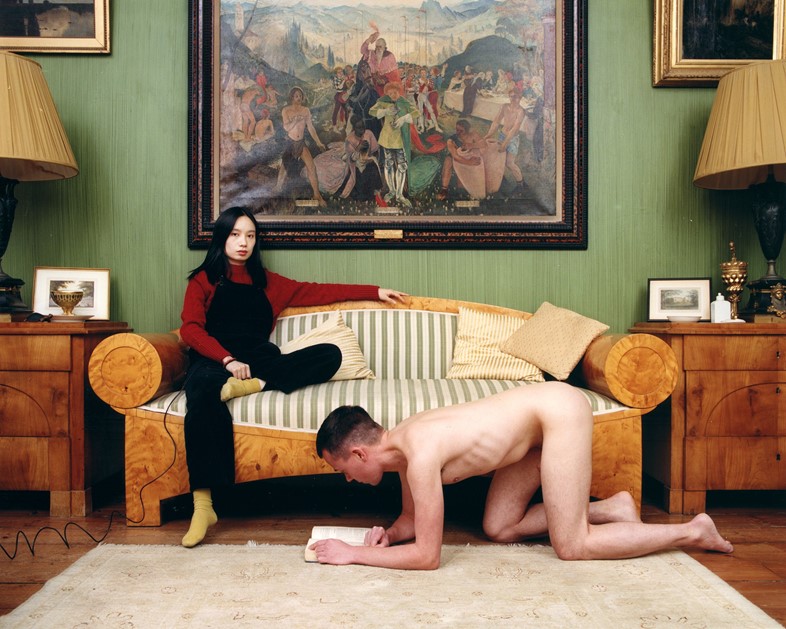
“Women have been looking passively for a really long time. It’s not like women didn’t look before, or they didn’t have a gaze before. It’s just like, there was never a stage or platform for women to express their desire. So I find it important to show my story, that I am the creator and this is what I desire, what I want.
“Even though I put myself in my images, I’m not really interested in proving my identity as a woman, if you know what I mean? Because it feels like men never need to prove anything, they’re just men. Look at how many self-portraits are made by heterosexual men – not many because they are not confused by who they are. And I feel like I don't need to prove myself anymore, I just want to show: this is what I want. And I hope that more and more women can do this.”
Baroness by Yushi Li is published by Baron Books and available to pre-order now.
